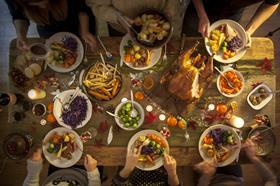
Grocery spending is set to grow by 2.4 per cent this Christmas, according to research organisation IGD, with shoppers predicted to spend £21.6 billion over the festive period.
With 48 per cent of shoppers agreeing that food and drink is the most important part of Christmas Day, shoppers are expected to spend an average of £90 for their household’s main Christmas meal this year, IGD reported. A third are estimated to spend over £100.
In good news for the fruit and vegetable sector, nine per cent of consumers are expected to opt for a vegetarian or meat alternative for their main course on Christmas Day. Younger shoppers in particular are planning to prepare vegan and vegetarian recipes this year, with a fifth of 18-34-year olds planning to make vegan dishes and one in four expected to eat vegetarian on Christmas day.
Vanessa Henry, shopper insight manager at IGD, said:“Although Christmas is very much wrapped up in tradition, we’re starting to see some new and interesting trends emerging in the run-up to the festive period.
“In particular, and similar to a trend we’ve seen emerging over the past year or so, there is a greater focus on vegan or vegetarian options for the main Christmas meal centrepiece.
“Growing media and social media coverage, coupled with greater investment by both retailers and suppliers in these products, means more shoppers are considering these meat-free alternatives this year.”
Technology will also play its part on Christmas day this year, with seven per cent of shoppers planning to use their Alexa or Google Home device to help them prepare for Christmas meals. This rises to 11 per cent of families and 17 per cent for 18-34-year olds.
Christmas is increasingly being seen as a time to splash out, with 71 per cent of shoppers taking this view compared to 66 per cent in 2017 and 54 per cent in 2016, suggesting that the majority of shoppers see the festive period as an opportunity to treat themselves and their families, having been cautious throughout the year.
Savvy shopping tactics are playing a part here to allow shoppers to manage the cost of Christmas. Shoppers are increasingly starting to shop for their Christmas food and groceries early to spread the cost, with 52 per cent claiming they start their shopping well in advance of the big day, up from 45 per cent in 2017 and 35 per cent in 2016.
Advertising is increasingly influencing grocery purchases over Christmas, with 35 per cent of shoppers admitting they are tempted to buy certain food and groceries based on adverts they have seen, compared with 29 per cent in 2016. This rises to 49 per cent of those under 45.
“The challenge over the Christmas period is how to create cut-through amongst all the other products and messages that shoppers are presented with in-store,” concluded Wainwright.
“It is important that retailers strike a balance between creating a point of difference and remaining relevant to their target shoppers.
“Those retailers and suppliers who work together to deliver a compelling in-store experience for shoppers will be well placed to make the most of impulse opportunities.”



